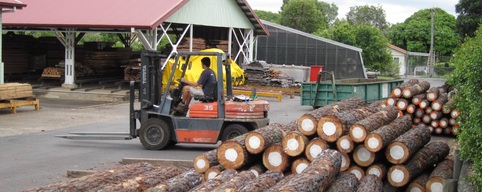

The European parquet market, a sector that has been navigating through challenges, is currently demonstrating signs of stabilization. The European Parquet Federation (FEP) reports that after facing a period of low activity, there is an observable trend towards steadiness in the market.
While the growth is modest, the European parquet sector is experiencing a slight uplift from its previously low baseline. This upturn, although not robust, is seen positively by stakeholders who have been witnessing sluggishness in the industry over recent years. Contributing factors to this improvement include shifting consumer preferences towards environmentally friendly flooring options and a heightened interest in interior decor trends that favor wood aesthetics.
Moreover, the renewed interest in home renovation, partly driven by increased time spent at home and a growing appreciation for sustainable living spaces, has bolstered the demand for parquet flooring. Many homeowners and property developers are recognizing the aesthetic and functional benefits of parquet, contributing to its gradual pickup in the market.
Despite the humble rise, experts caution that the sector still needs more consistent and robust growth to fully recover from its previous lows. Industry players are advised to remain vigilant and adaptive to changing market dynamics and consumer trends. The positive trajectory indicates a potential for better times ahead, especially if the momentum can be maintained amid the broader economic challenges.
Another encouraging sign is the committed efforts within the sector towards sustainability. Companies are increasingly adopting eco-friendly practices in the production of parquet, aligning with the growing consumer demand for products with minimal environmental impact. This strategic alignment with global sustainability goals is expected to further support the sector’s recovery by appealing to a broader market segment.
However, the sector must navigate through other hurdles to maintain this positive trend, including fluctuating raw material costs and varying demand in different European regions. The ability to innovate and diversify product offerings will be crucial for sustained improvement.
A significant development contributing to the stabilization of the European parquet market is the impact of antidumping measures. The European Commission has implemented provisional antidumping duties on multilayer wood flooring imports from China, providing some relief to European manufacturers. These duties are aimed at leveling the playing field, allowing local producers to compete fairly with imported products that were previously entering the market at lower prices.
The provisional measures have already started to show positive effects, with European producers gradually regaining some market share. These duties are a part of the European Union’s broader strategy to support domestic industries and counter unfair trade practices. It is anticipated that definitive antidumping measures will be enacted by July 2025, which could provide further support and stability to the market.
However, the broader context of global trade wars injects a degree of uncertainty into the future of the market. While the current impact on the parquet industry is not significant, the ongoing trade tensions create an unpredictable environment. Business strategies and long-term planning become more complex as companies must anticipate potential shifts in trade policies and their implications on international supply chains.
Despite the challenges, the commitment to antidumping measures underscores a concerted effort to protect and promote the European wood flooring industry. It reflects a strategic response to external pressures, aiming to ensure a fair competitive landscape that can foster growth and innovation within the market.
Industry leaders and policymakers must continue to monitor developments in global trade relations closely. Collaborative efforts and robust policy frameworks will be necessary to navigate the uncertainties posed by global trade tensions. Maintaining a focus on innovation and customer-centric approaches will be vital in charting a course towards a resilient and thriving parquet market in Europe.



